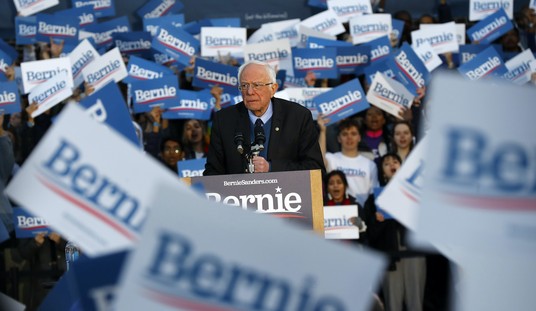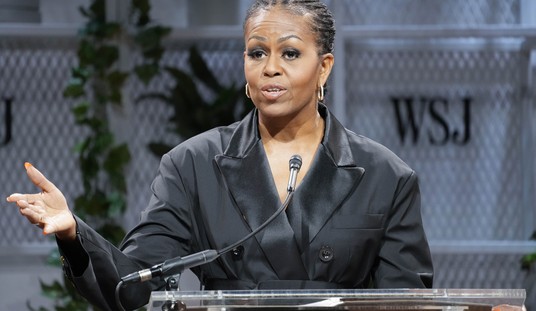The ridiculous spectacle of recent State of the Union events prompted different takes about how to either improve the situation, or do away with altogether. I took the latter position, while Jazz offered his thoughts on how we should enjoy the opportunities that the spectacle provides. Matt Lewis suggested that both parties dispense with the hopelessly overshadowed SOTU responses, and noted that the SOTU itself was far too tempting to presidents for them to resist their turn as ringmaster for the circus. “If the State of the Union is a pointless show with political benefits,” Matt wrote, “then the State of the Union Response is a pointless show with more risk than reward.”
That’s true — but only because of the power imbalance in the traditional State of the Union protocol. Those protocols could be subject to change, and that might allow for a much more interesting exercise than the current format, which produces nothing except obsequious and false adulation for the executive while leaving Congress itself as a punching bag for a President.
First, the SOTU takes place at the invitation of the Speaker of the House, who presides over all joint sessions of Congress. That came up as a point of contention this year, as some (including my friend Andrew Malcolm) advised John Boehner to withhold the invitation after Barack Obama’s unilateral action on immigration-law enforcement. He could certainly do that, but a refusal to host the President of the United States would be seen as churlish at best, even if it meant an end to the monarchical pomp and utter uselessness of the average SOTU.
Instead of setting up a snub, though, the Speaker should take a page from the UK’s sense of parliamentary debate. The Prime Minister in the UK doesn’t just deliver a speech in Parliament and expect nothing but dozens of standing ovations for clearing his throat. Members interact and debate with the PM, sometimes heatedly, in what seems at times like barely organized chaos. Prime Ministers hold regular weekly sessions in Parliament called Question Time, which make it very easy to remind the executive that he reports to them and not the other way around. This was Question Time yesterday, for instance:
In the US the President gets elected by the people through the states and isn’t promoted to the head of government by the legislature, as in the UK, so accountability is a little different between the two. However, the President has no particular right to speak in Congress either, which means that these sessions should be a matter of compromise that respects the integrity of both co-equal branches of government.
Instead of a Question Time type of system, the State of the Union should be structured as a form of House debate by the Speaker of the House as part of the invitation to the President to speak. It would start with a respectful entrance to the chamber, preferably with significant reductions to the pomposity of the process in use now, and an unlimited time for the President to speak. That would be followed by an identical amount of time — whatever it might be — to be split between the parties equally for questions from the floor of the joint session. This timekeeping would exclude the amount of time used in answers to prevent a President from filibustering to run out the clock. This debate would take place under House rules that exempt members — and in this case the President — from legal liability for remarks made.
This structure would produce a number of virtues. First, it would encourage Presidents to keep their remarks short. Next, it eclipses the need to have any kind of opposition response, as both the President’s opposition and his allies would have equal voice in questioning him and on the same grand stage as the SOTU address enjoys. Allies will no doubt waste time by extolling the President’s virtues, while the limited time that the opposition would get would focus them on meaningful challenges to the President’s actions and demands. Leadership in both parties would have a vested interest in keeping the process on track, while allowing for a variety of perspectives to come to the fore.
Of course, a President might choose to ignore questions in favor of speechifying, but the presider of the joint session could rule those responses out of order and politely ask that the President provide a direct response, returning time to the questioner to repeat the process and lengthening the amount of time that the President has to face questions. That will look rather uncomfortable on national television, certainly. A President could simply leave the floor after the speech, but that would look even more pusillanimous; who would respect a President who runs from Congress after having been loaned its platform?
Finally, a President could choose not to deliver the speech in Congress at all, but simply deliver an address from the White House and send the report over to Capitol Hill in writing. Gone would be the fawning entrances, the monarchical posturing, the endless standing ovations for the most mundane and meaningless campaign-speech drivel aired on national television, and with it the grand backdrop that Presidents since Woodrow Wilson have used to exalt themselves. At least that would have the virtue of reducing the nonsensical SOTU circus down to something close to its proper perspective, and reverse 100 years of degrading legislative obsequiousness to the executive branch.








Join the conversation as a VIP Member